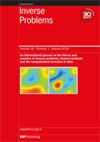CUQIpy: I. Computational uncertainty quantification for inverse problems in Python
IF 2.1
2区 数学
Q1 MATHEMATICS, APPLIED
引用次数: 0
Abstract
This paper introducesCUQIpy:I. 用 Python 计算逆问题的不确定性量化
本文介绍了 CUQIpy,这是一个用于逆问题计算不确定性量化(UQ)的通用开源 Python 软件包,是两部分系列文章的第一部分。CUQIpy 采用贝叶斯框架,将先验知识与观测数据相结合,生成后验概率分布,描述逆问题计算解的不确定性。该软件包提供了一个具有简洁语法的高级建模框架,允许用户轻松指定他们的逆问题、先验信息和统计假设。CUQIpy 支持一系列高效的采样策略,旨在处理大规模问题。值得注意的是,自动采样器选择功能可分析问题结构并选择合适的采样器,无需用户干预,从而简化了流程。CUQIpy 有多种概率分布、测试问题、计算方法和可视化工具可供选择,是一款功能强大、灵活且适应性强的 UQ 工具,适用于多种逆问题。本系列的第二部分重点介绍 CUQIpy 在偏微分方程反问题中的 UQ 应用。
本文章由计算机程序翻译,如有差异,请以英文原文为准。
求助全文
约1分钟内获得全文
求助全文
来源期刊

Inverse Problems
数学-物理:数学物理
CiteScore
4.40
自引率
14.30%
发文量
115
审稿时长
2.3 months
期刊介绍:
An interdisciplinary journal combining mathematical and experimental papers on inverse problems with theoretical, numerical and practical approaches to their solution.
As well as applied mathematicians, physical scientists and engineers, the readership includes those working in geophysics, radar, optics, biology, acoustics, communication theory, signal processing and imaging, among others.
The emphasis is on publishing original contributions to methods of solving mathematical, physical and applied problems. To be publishable in this journal, papers must meet the highest standards of scientific quality, contain significant and original new science and should present substantial advancement in the field. Due to the broad scope of the journal, we require that authors provide sufficient introductory material to appeal to the wide readership and that articles which are not explicitly applied include a discussion of possible applications.
 求助内容:
求助内容: 应助结果提醒方式:
应助结果提醒方式:


